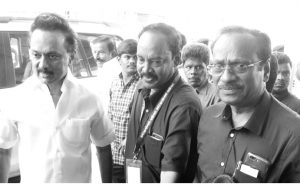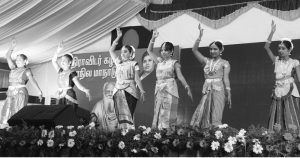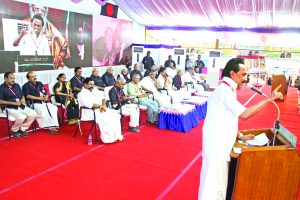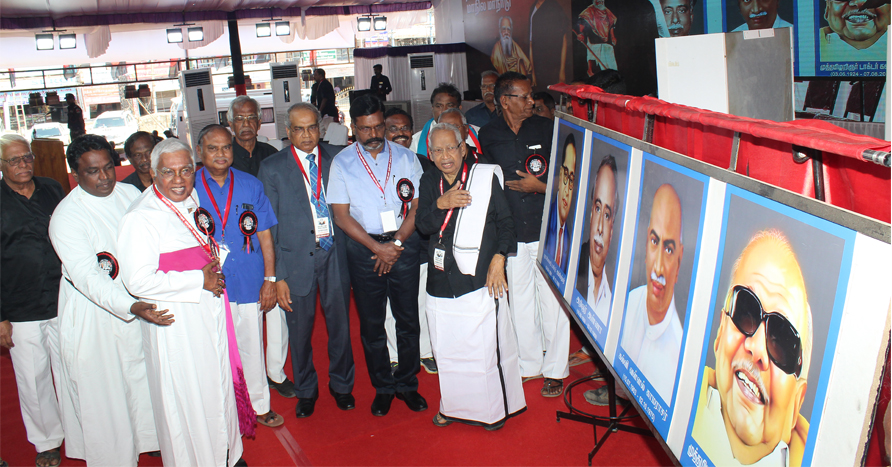Portraits of Babasaheb Ambedkar, Arignar Anna, Kamaraj, Kalaignar M. Karunanidhi unveiled.
Even 72 years after attaining Independence, people belonging to the Scheduled Castes, the Scheduled Tribes, Other Backward Classes and Minorities continue to be under – represented in the top posts and services of the Government. The policy of Social Justice has been enshrined in the preamble of the Constitution. There are enough acts, rules and regulations to provide reservation in admission to the educational institutions and employment in Government Services to the oppressed sections of people. But, in implementation of the Orders, several hurdles have been created, as the top posts in the Government have been predominantly occupied by Brahmins and Upper Castes.
Accepting the proposals of Dravidar Kazhagam and with the support of all political parties, an Act under Article 31-C of the Constitution of India has been passed in the Legislative Assembly of Tamil Nadu and the same was protected from the judicial review by its inclusion in the IX Schedule of the Constitution.
Despite the agitations by the social revolutionary Thanthai Periyar and the rights provided through the Constitution of India by Babasaheb Dr. B.R.Ambedkar, the amount of benefits the oppressed section of the people got so far from Government of India is very meagre, but the rights yet to be obtained are much more than that.
Keeping this in mind the Dravidar Kazhagam is organising and conducting this Social Justice Conference. We and all other parties having identical views are now in a position to join as a movement at the all India level and agitate for the implementation of these resolutions passed in this Conference.
- RESERVATION ACT
An Act has been passed by the Tamil Nadu Legislative Assembly providing 69 per cent reservation in admission to the educational institutions and in making appointments to the posts in State Government Services for people belonging to the Scheduled Castes, the Scheduled Tribes and Other Backward Classes and this Act has also been protected from judicial review by inclusion in the IX Schedule of the Constitution. Contrary to this no such Act has been passed by the Central Government to provide reservation in employment, in particular, but such reservations are implemented only through the executive orders. As a result so many hurdles are being created through judicial interventions for the implementation of such executive orders.
Though the Parliamentary Standing Committee headed by the Member of Parliament, Dr.M.Sudarsana Nachiappan, appointed by the UPA-I Government in 2005, to review the working of the Scheme of Reservation, has offered its recommendations, no follow up action was taken by the Government of India in this regard.
This Conference emphatically requests the Government of India to make a law to implement the policy of reservations to the people of the Scheduled Castes, the Scheduled Tribes and Other Backward Classes, similar to the law existing in Tamil Nadu.
- IMPLEMENT ALL THE RECOMMENDATIONS OF MANDAL COMMISSION
- a) The Second Backward Classes Commission headed by B.P.Mandal constituted as per Article 340 of the Indian Constitution submitted its report to Government of India on 31.12.1980. Nearly 38 years have passed, yet, only two recommendations providing 27 per cent reservation in admission to the educational institutions and in appointments to the Central Government Services to the people of Other Backward Classes have so far been implemented. Other recommendations to provide reservation for these people in judiciary, reservation in promotions and budgetary allocation of funds for their welfare have not been implemented so far.
- b) All the welfare schemes for the backward classes, who form the majority population of India, are at present implemented through the Ministry of Social Justice and Empowerment. Unlike Tamil Nadu and few other States, where there is a separate Ministry for Backward Classes, there is no separate Ministry for them in the Centre. There are separate Ministries for Tribals, Minorities, Women and Child welfare. Likewise, this Conference urges the Central Government to create a separate Ministry for the Backward Classes.
- c) In order that the people belonging to the Other Backward Classes have to get their legitimate share in all departments, this Conference emphatically requests the Government of India to implement all the recommendations of the Mandal Commission Report.
3. THE VIRUS OF ‘CREAMY LAYER’ HAS TO BE ERADICATED
Our Constitution empowers the State to provide reservation for the socially and educationally backward classes. There is no provision in the Constitution to provide reservation to the people on the basis of economic criterion. When the Act for the FIRST Constitutional Amendment was passed, the majority of the members of the Constituent Assembly have voted that economy yardstick need not be applied for providing reservations.
In Mandal reservation case, relating to 27 per cent reservation in Government jobs for the people belonging to Other Backward Classes, the Supreme Court has unnecessarily introduced the concept of ‘Creamy Layer’, because of which many of the people belonging to the Other Backward Classes were made ineligible to get the benefit of reservation.
Reservation is not a poverty alleviation scheme. It is an instrument to provide the opportunities at all levels of the Government to the people who have been denied so far. The introduction of the concept of economic criterion of creamy layer has to be abolished totally.
4.RESERVATION IN PRIVATE SECTOR
A NECESSITY
In an age in which the concepts of liberalization, privatisation and globalisation and their activities are expanding speedily, requirement of provision of reservations in appointments in private sector also, has now become essential in order to ensure social justice as enshrined in the Indian Constitution.
It is a matter of great concern that the percentage of reservations in appointments in Government and Public Sector Undertakings has not reached the percentage prescribed for the people of the Scheduled Castes, the Scheduled Tribes and Other Backward Classes.
Under such circumstances, the statement of Rajiv Kumar, the Vice-Chairman of NITI Ayog stating that reservations in appointments in private sector for SCs, STs and OBCs is not necessary, proves what type of people the BJP Government has appointed in responsible positions. This Conference would like to point out that when starting new industries in other countries, Indian capitalists and industrialists are giving the benefits of reservation to the workers as per the policy adopted in those countries. Non-provision of reservation in private sector to the workers of our country and the expression of irresponsible opinions by the Government officers is going against the rights and spirit of the Constitution. This Conference emphatically requests the Government of India to bring legislation to provide reservation in private sector also.
5.RESERVATION FOR WOMEN IN LEGISLATIVE ASSEMBLIES AND PARLIAMENT IS AN URGENT NEED
The representation of women in the current Parliament, having a total of 543 seats, is only 62 i.e. 11 per cent. Similarly the representation of women in the State Assemblies throughout India is only 311 out of the total number of 4030 i.e. 8 per cent.
In relation to People’s representation including women, this is against the principle of Social Justice. The 108th Constitutional Amendment Bill was presented in 1996 in the Parliament by then Prime Minister H.D.Deve Gowda and the same has not been passed so far. Postponing the issue any more is unjustified and unlawful. Hence this Conference emphatically requests the Government and the Members of Parliament belonging to all Political parties to bring in the legislation providing reservation for women, including the inner reservation for the Scheduled Castes, the Scheduled Tribes and Other Backward Classes, in State Legislative Assemblies and Parliament.
6. RESERVATION IN JUDICIARY
The High Courts and the Supreme Court of India are the only Constitutional organisations truly functioning as democratic institutions today. Whether the Acts passed by people’s representatives are as per law or not is decided only in the Court. Hence the flag of social justice should fly high in the Courts also.
At present there are 31 judges in the Supreme Court and some more posts are kept vacant. For the past so many years, no single judge belonging to the Scheduled Castes and the Tribes has been appointed in the Supreme Court, even though there are many leading Senior Advocates and legal experts belonging to these Communities available in the professional field. This is a great injustice.
Similarly only one Judge of the present Supreme Court belongs to the Other Backward Classes, who form part of 70 per cent of the population of our country. When such is the case, the Government of India is planning to introduce national level common entrance examinations for the appointment of Judges in lower judiciary also and undermine the existing principle of Social Justice followed in states like Tamil Nadu. When the principle of Social Justice is in vogue in the two pillars of democracy i.e. executive and legislature, following up the principle of Social Justice in the third pillar viz. Judiciary also is the right and desired course of action. This Conference enjoins the Government of India to pass the required legislation to provide reservations in the appointment of judges to the courts up to the level of the Supreme Court.
7. ‘NEET’ SHOULD BE PERMANENTLY ABOLISHED

Welcoming Thalapathy M.K. Stalin, President, DMK
Dravidar Kazhagam, other important political parties and Social Justice Organisations opposed vehemently the system of conducting National Entrance cum Eligibility Test called ‘NEET’ introduced for selecting candidates for admission into the Medical and Dental Colleges as it is against the principle of Social Justice to the Scheduled Castes, the Scheduled Tribes and Other Backward Classes and students from rural background. The results of NEET conducted for the years 2017-18 and 2018-19 have confirmed the warnings issued by Dravidar Kazhagam and others that it will do great harm to our students.
While there are so many educational schemes and patterns in practice throughout India, it is a great injustice and a ploy to conduct the NEET tests by the CBSE itself on the basis of its own syllabus. Hence this Conference insists the Government to put an end to the practice of conducting NEET.
This Conference also insists the Government of India to give assent to the Two Bills passed by the Tamil Nadu Assembly seeking exemption from conducting NEET. This Conference would also like to point out that the system of conducting NEET has been woven around so many frauds, confusions and shortcomings from the beginning itself.
This Conference is giving a clarion call to all the political parties, organisations and leaders to join together, raise themselves and burst like volcano, undertake struggles with the support of the public and succeed in their attempts to scrap the system of conduct of NEET.
This Conference would like to commend the Dravidar Kazhagam, which is raising its voice incessantly for this life and death problem of our students of Tamil Nadu, from the beginning and positioning itself to agitate against the NEET system even by going to New Delhi and giving top priority for this issue.
As restoring the subject of Education from the ‘Concurrent List’ to the ‘State List’ in the Constitution of India is the only permanent solution for this problem, this Conference requests all concerned to undertake this great task.
8. PROVISION OF 10 PER CENT RESERVATION FOR THE ECONOMICALLY WEAKER SECTIONS AMONG THE UPPER CASTE IS A FRAUD
The Government of India has recently passed legislation for a Constitutional Amendment so hurriedly in both the Houses of Parliament, within duration of two days, giving 10 per cent reservation benefits in education and employment to the economically weaker section of people among the forward castes. This will dismantle the foundation of the principle of Social Justice itself, which has got a glorious history of a century and witnessed various kinds of staunch agitations and struggles. The assent of the President of India was also obtained hurriedly for this Bill and a notification was also published in the Central Gazette that this Act would come to force from 14-01-2019.
Dravidar Kazhagam, Dravidar Munnetra Kazhagam, Viduthalai Chiruthaigal Katchi and some other social service organisations have filed cases challenging that the Act giving reservation for the people belonging to the upper castes it is against the principles and basic structure of the Constitution of India.

Cultural Performance of the students of Periyar Centenary Educational complex.
Reservation is a fundamental right to provide empowerment to the people belonging to socially and educationally backward communities. This Social Justice Conference would like to caution with a farsighted vision that if economic criterion is also thrust into reservation policy, there is a danger of amending the Articles 15 (4) and 16 (4) of the Constitution introducing economic criterion for the socially and educationally backward classes and Scheduled Castes/Tribes. Already, economic criterion is being pushed through backdoor in the name of ‘creamy layer’ for the backward classes.
Calling the upper caste people as weaker sections to provide reservations to them is a grave fraud. The real fact is that the upper caste people are dominating in the fields of education and employment irrespective of the fact whether they are poor or rich. The data obtained through the Right to get Information has also confirmed this. Categorising Upper caste people earning an annual income of Rs.8 lacs (Rs.65000 per month) as poor is a mockery.
This Social Justice Conference is giving a clarion call to all the political parties and social organisations to join together and to fight against the reservation benefits given by the BJP Government to the people belonging to forward castes, which will prove to be the death knell of the principle of Social Justice.
9. OPPOSITION TO THE IMPOSITION OF HINDI
Importance and space is not being given for the State news by Doordharshan, Pothigai T.V. Channels and Radio Broadcasting Channels, which spend all their time in singing a chorus praising the Prime Minister Narendra Modi. The functioning of these information and broadcasting organisations giving priority for the imposition of Hindi and for the religious events is both unlawful, unjustified and against the rights of the States. The usage of the word ‘Akashvani’, which was discontinued earlier once again, finds a place in these broadcasts.
Recently advertisements are being projected unnecessarily in Hindi in the F.M. Tamil Broadcasting programs and in Cinema theatres.
In the remittance chalan forms of the nationalised banks, Tamil version has been removed and Hindi version is replaced in its place. Hindi is being made compulsory in many aspects among the employees working in Central Government Offices and Departments in Tamil Nadu.
This Conference cautions the Government of India that if the sentiments of the people go disrespected in the matter of imposition of Hindi on them, it will result in creating grave consequences.
10. ALL COMPETETIVE EXAMINATIONS OF THE CENTRAL GOVERNMENT MUST BE CONDUCTED IN ALL LANGUAGES INCLUDING TAMIL
For the appointment of personnel in Central Government Services such as All India Civil Services including I.A.S and I.P.S., Union Public Service Commission, Railways, Banks, Insurance companies and other Public Sector Institutions, competitive examinations are being held only in Hindi and English languages. Due to this, a large number of candidates from the northern states, particularly from States like Bihar, Jharkhand, Odisha, are selected and appointed in the Southern States. The number of candidates so appointed has of late increased considerably.
Moreover, the rule that candidates aspiring for appointment to the C and D Groups in Central Government Services and clerks in Banks in a State, must have the knowledge and proficiency of the official language of that State has been changed as ‘preferable’, consequent to which a situation has arisen where candidates from North Indian States having no knowledge of language of the respective State are appointed in those States. Particularly in Tamil Nadu, this trend is on the rise.
The future of the many lakhs of educated graduate youth in Tamil Nadu waiting for employment has become a big question mark and this is creating a great turbulence in the Southern States.
Social Justice is not mere reservation policy; but it includes safeguarding the rights of the States also. On the basis of this premise,
1) All the competitive examinations for the appointment of personnel in Central Government Services and other public sector institutions should be conducted in all the Indian languages, including Tamil, listed in the VIII Schedule of the Constitution of India.
2) Instead of conducting National level Competitive examinations for the appointment of personnel in Central Government Services and other public sector institutions, conduct of State-wise examinations or Zone-wise (e.g. Southern States) will create more opportunities for the candidates in their own States according to their educational qualifications. It must also be ensured that the knowledge of official language of the State is made compulsory for all the people working in the State.
This Conference emphatically requests the Government of India to bring legislations for giving effect to these resolutions.
11. RESERVATION TO MINORITIES
The report of Justice Rajindar Sachar Committee was submitted in November 2006 to the Government of India, relating to social, economic and educational status of the Muslim Community of India. None of the recommendations of the Sachar Committee has been implemented so far including ensuring adequate representation for them and other minorities. This Conference requests the Government to implement the recommendations of Sachar Committee without any further delay.
12. IT IS WRONG TO CLOSE DOWN SCHOOLS
The action of closing down government and local bodies schools on the grounds of insufficient strength must be given up. The reasons for the reluctance of the students to join the schools must be examined and the shortcomings must be rectified. It is wrong to close down the schools once for all. This Conference points out that it will prevent the children from receiving proper schooling and encourage dropouts.
13. RESERVATIONS A MUST WHILE SELECTING THE UNIVERSITY TEACHERS.
This Conference condemns the absence of details of reservations in the notification in selecting the teaching staff for universities, and enjoins upon the Central Government to strictly follow the policy of reservation at all levels in all universities including Central Universities.
14.CONTINUOUS PUBLIC EXAMINATIONS MUST BE AVOIDED
The very idea of holding public examinations at the V and VIII class level must be nipped in the bud. Already there are three continuous public examinations at the conclusion of X, XI and XII classes.
Public examinations at the V and VIII class levels will mean detention of students at those levels. This will affect the students of the depressed classes and rural first generation learners. The policy of no-detention till the VIII class level, followed as per the recommendation of educationists, was given up by the BJP, but later restored in the face of severe opposition. Yet, the recommendations of New Education Policy 2016 are introduced piecemeal in this fashion. Such indirect and shortcut attempts must be given up, since such examinations will increase the mental pressure of the students.
To prevent the attempts of some schools to prepare the students straightaway to XII class public examinations, neglecting the fundamental XI class syllabus, some other remedial measure can be devised, and this Conference insists the government to reconsider the conduct of public examinations for the V and VIII class levels.
15. GIVE UP THE SCHEME OF NATIONAL MEDICAL COMMISSION 2017

Citing the reason that the autonomous Indian Medical Council formed as per the Indian Medical Council Act 1956 for regularizing the medical education has developed some defects and introducing National Medical Commission Act (NMC) 2017 is, the Conference declares, harmful in many respects.
Members for the existing Medical Council are selected from all States in a proportional manner. But in the Commission to be formed 20 out of 25 members will be nominated by the Central Government. Even the members need not belong to the medical field. Only 5 members will be representing all the States, leaving a majority of States unrepresented, bringing it totally under the control of the Central Government. It is obvious that the formation of the commission is against the social justice and rights of the States.
As per the existing Medical Council Act, seats were distributed in the proportion of 65 per cent for government quota and 35 per cent for management quota. But as per the new Commission Act, the government quota will be 40 per cent and management quota will be 60 per cent. This encourages moneyed people to enter private medical colleges in large numbers. Since the number of seats in government medical colleges is reduced it will block entry of economically backward people into medical colleges.
According to the regulations of the new Commission, those who go out after completing that medical education are compelled to undergo another entrance examination, namely, National Exit Examination(NET). Only those who pass this examination can practise as doctors. If they fail they have to wait for another six months. All these steps will end up humiliating those who have completed more than five years of education and come out successfully in the University Examination and will render their future uncertain. Since such steps will act as deterrents to first generation medical students, this Conference enjoins upon the Central Government to withdraw the National Medical Council Act 2017 and to continue with the already existing Medical Council after duly rectifying all its defects.





